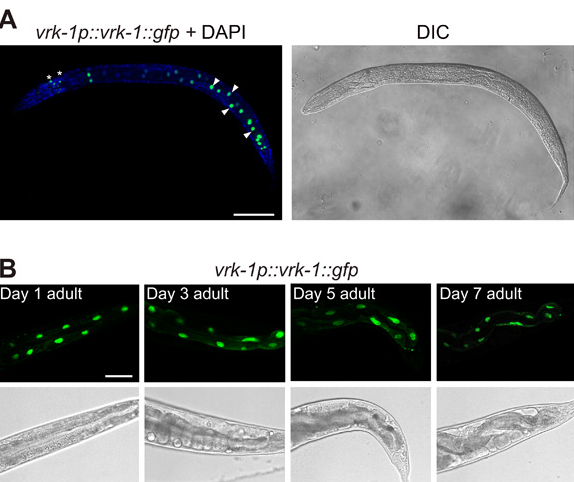It is known that the mitochondria is called the powerhouse of the cell, without which there will be no energy production in the cell, thereby the body too! Along with this mitochondria has its role in other important functions, one crucial role being in aging.
Research has shown that age-related diseases are linked to mitochondrial functioning. Further, it is known that "mild inhibition of mitochondrial respiration" promotes longevity in many species, which means to mildly slow down mitochondria's energy-making process. Thus, the life-span extension compensates for the reduced mitochondrial respiration.

An enzyme called AMP-activated protein kinase (AMPK) that promotes mitochondrial health is also known as anti-aging protein. The same enzyme plays a crucial role in life-span extension by reducing mitochondrial respiration.
Worm Research
Research on roundworms has shown that an enzyme called VRK-1 can extend their lifespan. VRK-1 does this by increasing the level of AMPK resulting in an increase in its activity, promoting longevity through phosphorylation.
This is an important finding in the research of extending human lifespan too.
Korean scientists published a paper this Wednesday in Science Advances, that showed how the lifespan of worms was extended by varying VRK-1 levels.
The Experiment
Roundworms normally have a lifespan of about two to three weeks. But the genetically engineered worms in the experiment, having elevated levels of VRK-1 lived about 23.7 days on average - they lived longer. When they inhibited the function of VRK-1 in other worms, they found that their lives were shortened.
Lab-controlled worms that lived 20.3 days on average, lived only 12.7 days as VRK-1 was inhibited. That is, the worms died sooner.
A senior author of the paper, Seung-Jae Lee, professor at the Korea Advanced Institute of Science and Technology told Inverse that the key to activating longevity was in the anti-aging protein, AMPK, while the key to activating AMPK is VRK-1. The VRK-1 enzyme is found in worms and has its cousin in human cells, that's very similar to it.
Humans?

"Therefore, it is possible that this mechanism can be applied to promoting human longevity in the future," he added.
Similar patterns were shown in cultured human cells in the experiment, Lee said, showing that the process holds even in complex organisms.
Replicating the study in animals, like mice will show it's likeliness in humans. However, scientists still don't know how exactly the process occurs.









